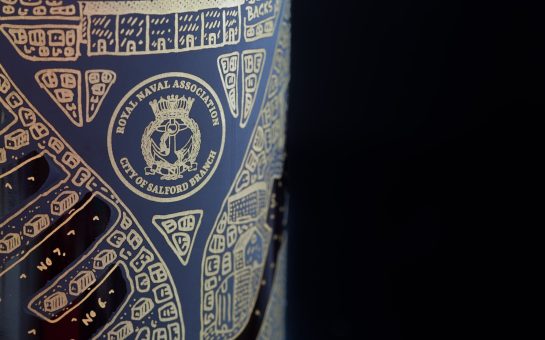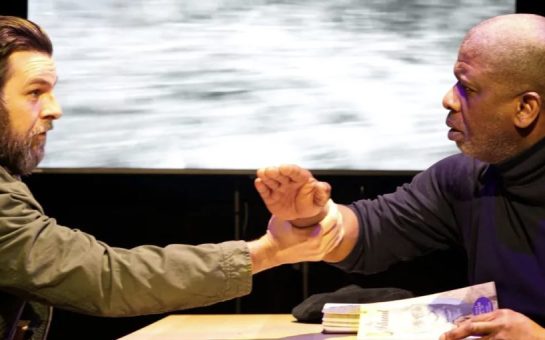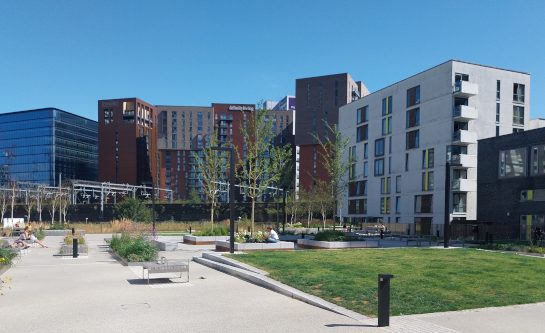To better understand the man who was the victim of appalling racist graffiti in Salford last month, we need to go back 22 years.
It’s some journey.
The year is 1997 and Jackson Yamba is making his way with his family from Brazzaville in the Republic of Congo to Kinshasa in the Democratic Republic of Congo.
They are escaping the civil war that has broken out between supporters of the acting President Lissouba and his fierce rival Denis Sassou Nguesso.
They have already witnessed much suffering and seen many killed. But what happens next will leave a lasting impression on Jackson.
As they approach the border, they come across a checkpoint, manned by militiamen. In front of them is a young family of five.
With their AK47s the militiamen gun down the young family in cold blood. The dead include children and babies. The Yamba family are able to flee to safety.
Though haunted by these memories to this day, they have helped forge his steely determination and commitment to protect the dignity of human life through the defence of human and civil rights.
‘NO BLACKS’
As a lawyer and then barrister, he would help to secure the release of many human rights activists in the DRC.
Jackson, who lives with his 10-year-old son David, shot to national prominence this February, as a result of the racist graffiti that was sprayed on his front door by a neighbour.
Using a spray can, the neighbour had written the words “no blacks” on three doors.
Although he reported the incident to police immediately, they failed to send anyone to investigate for over a week. On the advice of some friends, Jackson sent out a tweet showing the racist graffiti and within an hour received 3,000 messages of support.
My front door in Salford was painted over a week ago with this abhorrent racist graffiti – after reporting it to @gmpolice they still haven’t been here to investigate. How do I assure my traumatised 10 year old that he is safe in his home? @BBCBreaking @RLong_Bailey @guardian pic.twitter.com/WjGEz9rT7e
— Jackson Yamba (@JacksonYamba) February 16, 2019
By the next day the number had grown to 10,000 and today the count stands at roughly 21,000. A tiny minority of the messages have been less supportive, with some accusing him of having painted the graffiti himself.
One went as far as to even use the “n” word. However, Jackson has been overwhelmed by the support he received, which included an invitation for him and his son to attend a Salford rugby league game as guests of the club.
As a result of the huge publicity the police launched an investigation, which led to the arrest and charging of a neighbour. The incident was covered by almost all the national papers, as well as making it onto national television news.
There is a tendency to think about immigrants and refugees in the abstract, which objectifies and depersonalises them as people. This in turn allows for lazy caricatures and stereotyping, which inevitably plays into the hands of people with racist political agendas.
Last night @JacksonYamba and his 10-year-old son David were our guests of honour and brought the match ball onto the field.
We hope they enjoyed the welcome from the TRUE Salford community!
We truly are #TogetherStronger! pic.twitter.com/sDXnXfa4rj
— Salford Red Devils (@SalfordDevils) March 1, 2019
It is not uncommon to hear the charge that immigrants come to the UK to milk the “generous” benefits system for all it has. What is often forgotten is that these people are human beings with deeply compelling and complex stories of their own to tell.
Jackson’s story is a case in point.
‘I ALWAYS WANTED TO PROTECT PEOPLE’S RIGHTS’
Academically gifted, Jackson was encouraged to study law at the University Libre in Kinshasa by both his father and uncle, who was a barrister. Within a year of arriving in Kinshasa and starting his studies, the second Congo war broke out in the DRC in 1998, a war that caused huge devastation and loss of civilian life.
A report published by the International Rescue Committee in 2008 estimated that the war was responsible for some 5.4 million deaths over a 10-year period.
Living in Kinshasa, Jackson was relatively sheltered from the war, although Rwandan troops occupied the capital in August 1998 for two months, leading to chronic shortages of money and food.
Within a year of graduating in 2003, he qualified to be a barrister, before landing a job with the UN Refugee Council as an executive secretary. At the age of just 25, he was managing a team of over 30 people and was travelling all over Africa, helping to protect refugees in conflict zones.
He describes the job as like winning the jackpot. It gave him the unique opportunity to both learn more about international law, but also to be actively involved in defending people’s rights.
“It was mainly because of my background,” he tells MM, chatting openly in his Salford flat.
“Being a lawyer, I always wanted to protect people’s rights. I believe that was an opportunity for me to go with the UN to protect those rights.”
However, the job came with its emotional and psychological stresses, as he was invariably a witness to great suffering, and it was not always possible to provide sufficient relief for those in dire need.
The decision to come to the UK was down to an opportunity for promotion within the UN. Although a polyglot, who speaks Lingala, French and Portuguese, at the time he had no English.
As the promotion was conditional on possessing fluent English, he enrolled to do an English course in Leeds. Travelling on a UN passport, he was promptly detained by the British Border Agency, who refused to believe that at such a young age he could be a UN diplomat.
On verifying his credentials, he was granted a visa to study. The original plan was to study for two years, before returning to the DRC and resuming his career. His life was changed irrevocably while in Leeds.
It was there that he met the woman who was to become the mother of his son David. When she became pregnant with David in 2007, Jackson decided to apply for permanent residency, which he was eventually granted in 2011.
He was neither allowed to work or travel outside the UK during that whole time. He was also not entitled to receive any state benefits. David’s mother is from Nigeria and at the time was an asylum seeker and was also prohibited from working.
From his arrival in the UK in 2006, until he was granted residency in 2011, Jackson had to support himself and then his young family from his own savings and whatever contributions his family and friends could make.
He has never claimed benefits. If there is one thing during our conversation that seems to irritate and frustrate Jackson above all, it is the way in which some people seek to stereotype and pigeon-hole Africans.
“They think you are an asylum seeker, coming for benefits,” he bristles.
When a colleague at work accused him of being an immigrant who wanted to fiddle the benefits system, Jackson decided to sue the firm. They reached an out of court settlement.
Jackson hardly conforms to this ignorant and cheap stereotype. He is a highly intelligent and motivated person. He has a law degree and is a fully qualified barrister. He is currently studying part-time to complete a Master’s degree in Law, while at the same time working to support himself and his son.
‘BLACK, WHITE, BROWN’
He has previously worked in a job that entailed huge responsibility in providing protection to vulnerable and dispossessed people.
He has borne witness to all the suffering that war and conflict entails in both his private life and professional work, experiences that most of us can barely imagine.
So when he describes the incident of the racist graffiti as an “abhorrent crime”, you are immediately struck by the degree of the hurt, anger, and vulnerability that he felt.
Above all it was the distress of his son that so shook him and fired his anger.
“The fact that my son was traumatised, I needed to take action. My son was so traumatised that day and I was also affected by the incident, because of my son.
“My boy was affected daily. And I couldn’t sleep at night. We had a lot of questions. Because the police were not there we thought ‘Will they come back again?’”
By reporting the incident to the police, Jackson wanted to set the right precedent to David. He wanted to show that as a human being you have legal rights, designed to protect the sanctity and dignity of human life.
“I was terrified. I wanted to stay indoors because I thought someone was going to be waiting, or something was going to happen”
10-year-old David Yamba found racist graffiti saying “No Blacks” painted on three doors in his block of flats https://t.co/0EkRHRMCc3 #VictoriaLIVE pic.twitter.com/MwMBY7OTJH
— Victoria Derbyshire (@VictoriaLIVE) February 20, 2019
These rights must be respected and enforced, otherwise they have no value and can be taken away.
Having seen and experienced how these rights can be abused and trampled upon by unscrupulous and brutal politicians, Jackson is keen that his son should learn the value of standing up for and defending his civil and legal rights.
In Jackson, David has a father who is better placed than most to teach that lesson. And given the rise of President Trump and authoritarian populists in Europe, for whom legality along with human and civil rights are an inconvenience at best, the message should resonate with a much wider audience.
The final word goes to Jackson. Is there a message he has for racists like his neighbour? His reply is eloquent, impassioned and defiant.
“We are living in the 21st century; black, white, brown. You are just a diversity, it is people,” says the 38-year-old.
“I pretty much compare human races to the beauty in the garden. When you go into the garden, you find flowers of different colours. What makes the beauty of the garden are the different flowers and their different colours.
“It is pretty much the same with society. We may have different colours, but that is what makes society beautiful. We are all human beings and are one family of the human race. We should not treat people based on their colour or religion.
“We are a multicultural society and we should treat people with dignity and respect.”



